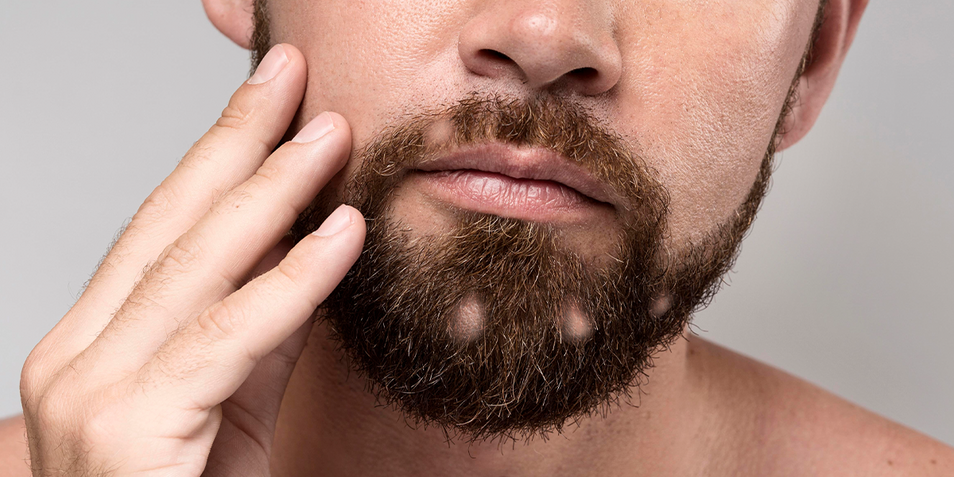Your Bag 0
Your Cart Is Empty
Choose a plan that works best for you

Losing hair from your head is one thing, but unexpected beard loss? That's an entirely different ball game that can send many men into a spiral of worry and difficulty finding solutions.
If you've noticed your once full and lush beard thinning out, developing patchy areas, or shedding more than usual, it might be time to consult a professional. But how do you know when it's more than just a bad beard day?
Here, we'll dive into the signs and symptoms of beard loss that warrant a doctor consultation, explore some potential underlying causes, and discover why seeking professional help can be a game-changer.
When your facial hair starts acting out of the ordinary, leading to beard loss, it can be challenging to pinpoint the cause. Here are a few red flags that suggest a visit to the doctor could be beneficial:
Sudden Loss Beyond Normal Shedding
A few hairs falling out here and there is nothing to worry about, but it's a red flag if you start noticing bald spots or significant thinning out of nowhere. This unexpected beard loss could hint at an underlying problem that needs addressing.
Patchy Areas Indicating Irregular Growth
Patches of hair loss in your beard aren't just aesthetic issues; they often signify conditions like alopecia areata. These irregular growth patterns can lead to self-consciousness and are a clear sign that a professional evaluation is necessary.
Scaly Patches Accompanied by Itching or Redness
Scaly, itchy, or red patches under your beard indicate skin conditions contributing to beard loss. Skin health is closely tied to hair growth, so these symptoms should not be ignored.
Excessive Shedding That Raises Concerns
Observing more hairs in the sink than usual could be alarming. While everyone's shedding varies, a noticeable increase could indicate a problem lurking beneath the surface, spurring questions like "how to stop beard loss."
Accompanying Symptoms Like Brittle Hair or Other Bodily Hair Loss
Sometimes, beard loss doesn't come alone. If you're also noticing your hair becoming more brittle or hair loss in other areas, it could point to broader health issues such as nutritional deficiencies or hormonal imbalances.
Sudden Changes in Beard Texture or Growth Rate
An evident decline in your beard's growth rate or changes in its texture could also signal underlying issues worth a doctor's visit.

A bunch of factors can contribute to your beard loss, including:
Hormone Imbalances
Imagine your beard as a flourishing garden and hormones, particularly testosterone, as the water. Too little or too much can mess with the growth, leading to a drought (loss) or overgrowth (too much hair elsewhere but not your beard). It’s a delicate balance, and when it tips, beard loss might come knocking on your door.
Nutritional Deficiencies
Your body needs a cocktail of nutrients to keep every part of you, including your beard, in tip-top shape. Lack of vitamins and minerals, think Vitamin D, Biotin, or even protein, can lead to hair not getting the nutrition it needs to grow strong and resilient. This can trigger difficulty in finding solutions for keeping that beard lush and full.
Stress
Yep, the same culprit stealing your sleep and turning your hair gray can also be thinning out your beard. When you're under a lot of pressure, your body pumps out cortisol, a hormone that, let's just say, isn't a big fan of your hair growth plans. This unwelcome guest can lead to hair follicles taking a nap, resulting in those worrying patchy beard loss areas.
Skin Conditions
The canvas for your beard masterpiece? Your skin. Conditions like eczema, psoriasis, or dermatitis create an environment more hostile than inviting for hair growth, leading to patchy beard loss. It's like trying to plant flowers in rocky soil—possible, but with a lot more effort and less success.
Medical Conditions
Some health issues pull a sneak attack on your beard. Autoimmune diseases, for example, can mistake your hair follicles for unwanted invaders and attack them, leading to hair loss. Thyroid problems can also throw your body’s balance off-kilter, including how your hair grows or doesn't.
Lifestyle Factors
Sometimes, how you treat your beard and what you put into your body can be the villain in this story. Poor grooming habits, smoking, or even just not getting enough sleep can wear down your beard’s defenses against hair loss.
While it’s tempting to rely on internet searches for answers to questions like "Why is my beard falling out?, or “What is the best treatment for beard loss?" consulting with a professional offers unbeatable benefits. Dermatologists and trichologists specialize in hair and skin health, providing:
Early Diagnosis: Crucial for addressing the issue effectively.
Access to Treatments: Professional guidance opens the door to specific treatments beyond over-the-counter options.
Tailored Guidance: Expert advice can be customized to your unique health profile.
Alternative therapies, including supplements and hair growth products, often promise quick fixes for beard loss.
While they might offer some benefits, the importance of "consulting a doctor first" cannot be overstated. Professionals can help you navigate these options safely, ensuring they complement other treatment strategies without exacerbating the problem.
For men grappling with unexpected beard loss and the fear of underlying health issues, recognizing when to seek help is crucial.
Whether you're pondering "why is my beard falling out," trying to identify "what causes patchy beard loss," or seeking the "best treatment for beard loss," expert consultation is key to finding effective and safe treatment options.
By tackling the problem head-on with the support of a dermatologist or trichologist, you can take informed steps towards addressing your beard loss, armed with the knowledge and treatments necessary to restore your beard to its former glory.
So, don't hesitate—take that essential step of seeking professional advice today.